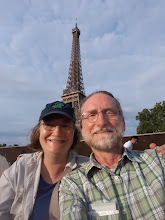"The Real Mom"
"Do you have kids of your own?" "What happened to their real parents?"Yes, we have five kids of our own. Adopted children are treated the same under the law as biological children. And Jonathan and I are not fake parents--we're living and breathing, just like all other parents. We do all the many things that parents do--love our children, enjoy them, care for them, discipline them, drive them, attend their games and concerts, etc., etc.
It's amazing how often we hear these kinds of questions. And a few times, they've come our way even though the kids are with us! That's quite painful and awkward, especially for the children. The questions have always come from well-meaning people who really care but don't realize the implications of what they are saying. I could snap back with a sarcastic remark, but it's obvious the questioners don't mean to be hostile. So, I usually tell them that we didn't have any biological children before we adopted our five kids. And I say that the children's situation in Ukraine was very complicated--so far, everyone has taken that as a signal that the topic is off limits. The children's story is their story, not mine, and they can choose in the future with whom they will share it.
Every adopted child has at least two sets of parents--birth parents and adoptive parent(s)--with whom the child must reconcile similarities and differences to become a healthy, independent adult. For example, an important developmental goal for teenagers is to differentiate oneself from one's parents. Adopted children must do this with two sets of parents, not one. And even in the case where there is no contact with the birth parents, the child still must psychologically work out these issues. Having no contact doesn't mean that the memories and ideas about the birth parents aren't there. Our older children have very specific memories of their birth parents, and the younger children have added their older siblings' stories to their own less specific memories. In addition, the younger children have fantasized things about their birth parents to fill the gaps in their own memories. All of this is perfectly normal, according to the adoption literature.
The unseen presence of the birth parents is manifested in adopted children in many ways. One example has been described at length, both by the literature and by our counselors:
All children become experts at learning the issues that bother their parents and then pushing those buttons. We've been warned that almost all adopted children will at some time use the phrase "You're not my real mom/dad" when they are angry or trying to get their way.
Several months ago, one of our children refused to stop fighting with another sibling, even though I specifically demanded an end to the fight. Ordinarily when I request a change of behavior from one of the kids, I allow a cool-off period so they can think about what I've requested. This situation, however, required an immediate end to the undesired behavior. I physically blocked the fight from continuing, although I was careful not to use corporal punishment. (We learned in our foster care training that corporal punishment is not allowed for any child, let alone ones from difficult backgrounds.) Even though the physical part of the fight was over, the verbal part continued, right in my face--"Don't touch me!" and "You can't tell me what to do!" I retorted, "I'm your mom, and you have to listen to me!" I waited tensely for what I figured was the inevitable reply: "You're not my real mom, and I don't have to listen to you!"
With the child's eyes blazing at me, and our faces only inches apart, he/she screamed at me: "YOU MAY BE MY MOM, BUT I DON'T HAVE TO LISTEN TO YOU!" Suddenly, my whole being was filled with joy, even in the midst of such intense conflict.
I am a real mom.


0 Comments:
Post a Comment
<< Home